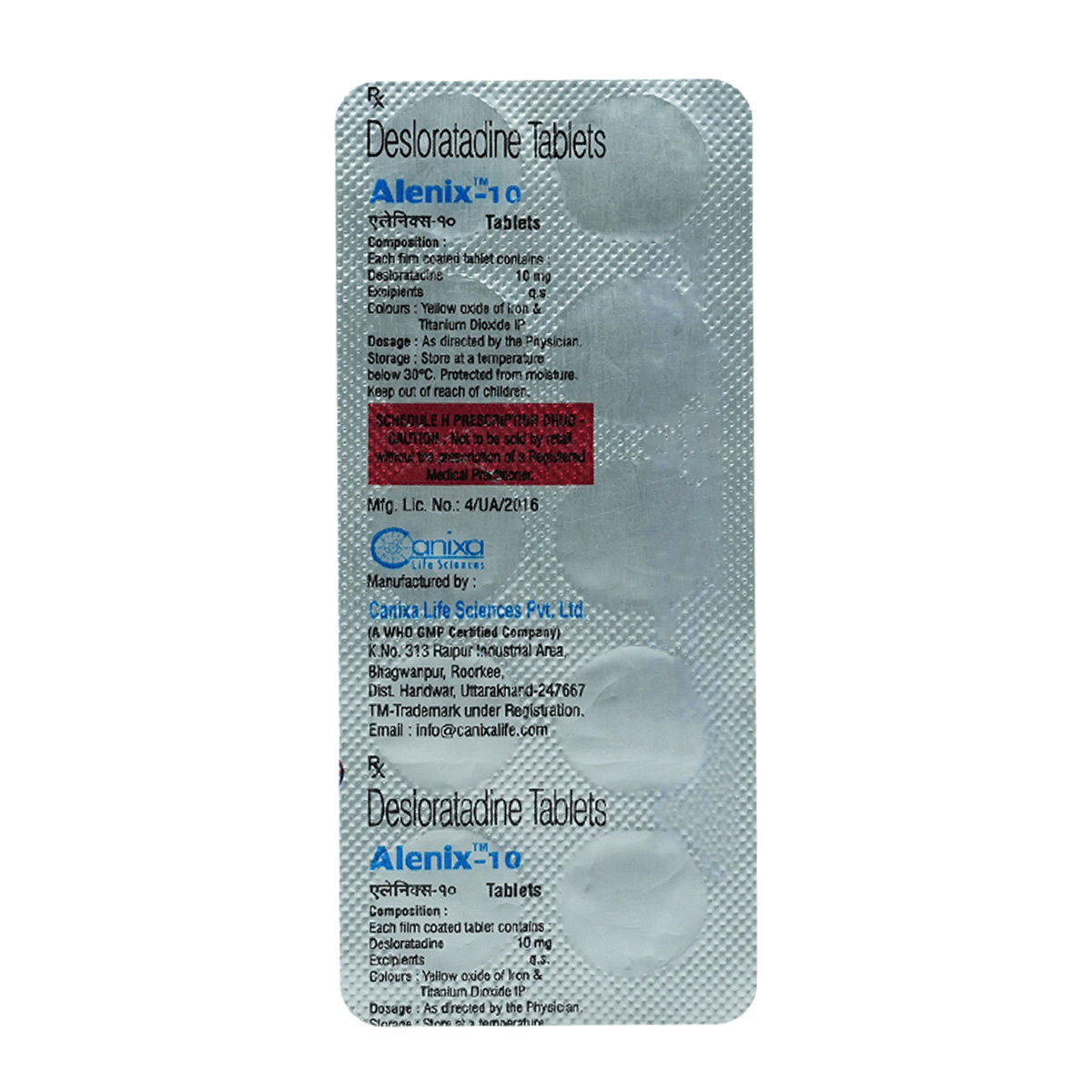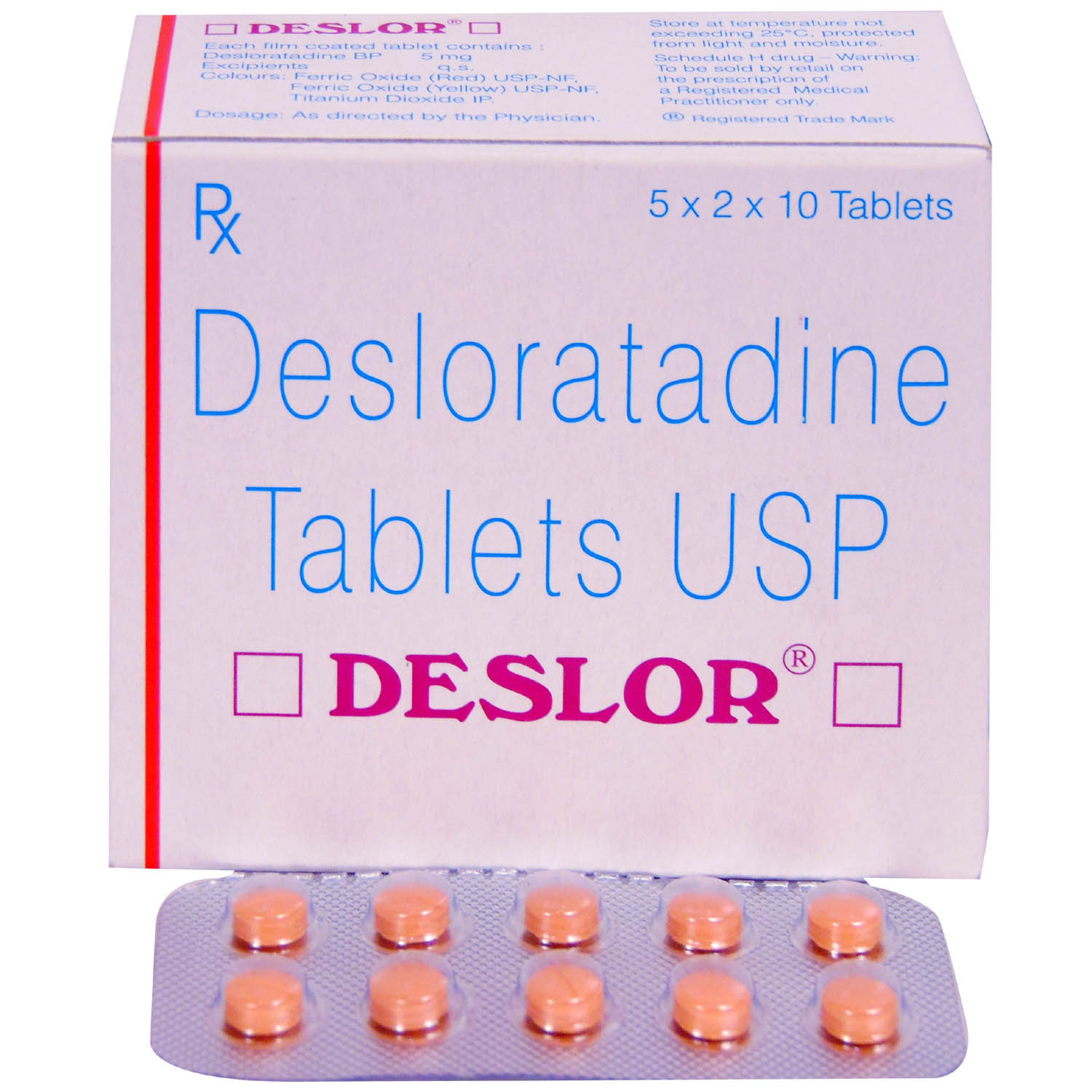Desloratadine
About Desloratadine
Desloratadine is used to treat allergic rhinitis and urticaria. Allergic rhinitis (hay fever) is characterised by a runny nose, sneezing, red, watery, itchy, and swollen eyes occurring due to exposure to allergens. Urticaria is an itchy skin reaction triggered by various factors, including food, medications, or other irritants.
Desloratadine contains ‘desloratadine’, which acts as an antihistamine. It blocks the action of histamines (chemicals causing allergic symptoms) and reduces the allergic reaction. It provides quick relief from allergic symptoms.
Desloratadine may cause side effects such as fatigue (lack of energy), dry mouth, and headache. In general, these side effects typically subside without treatment. However, if these persist or worsen, consult your doctor immediately.
Do not use Desloratadine if you are allergic to desloratadine or any other contents present in it. Inform your doctor if you have previously been diagnosed with seizures (fits) and liver or kidney failure. Inform your doctor if you are pregnant, planning to become pregnant, or breastfeeding.
Uses of Desloratadine
• Allergy Relief: Desloratadine effectively alleviates symptoms of allergies, including sneezing, itching, and runny nose.
• Hay Fever Treatment: Desloratadine helps reduce symptoms of hay fever, such as nasal congestion and eye irritation, offering relief to affected individuals.
• Treatment of Urticaria: Desloratadine is effective in managing urticaria (hives), soothing itchy rashes and providing comfort.
• Management of Allergic Skin Conditions: Desloratadine is useful in treating various allergic skin conditions by reducing inflammation and itchiness.
• Cold Symptoms Relief: Desloratadine may also aid in relieving common cold symptoms, such as nasal irritation and sneezing, enhancing comfort during illness.
Medicinal Benefits
- Desloratadine contains ‘desloratadine’, which belongs to the class of ‘phenothiazines’.
- It is an antihistamine and blocks the action of histamines (chemicals causing allergic symptoms).
- It can effectively treat allergic symptoms such as itching, watery eyes, hives, runny nose and sneezing without causing drowsiness, unlike other antihistamine medications.
Directions for Use
- Desloratadine can be taken with or without food.
- It is usually taken once daily or as prescribed by your doctor.
- Swallow Desloratadine as a whole with a glass of water.
- Do not crush, chew, or break it.
Storage
Side Effects of Desloratadine
- Fatigue (lack of energy)
- Dry mouth
- Headache
Drug Warnings
- Do not use Desloratadine if you are allergic to ‘desloratadine’ or any other contents present in it.
- Inform your doctor if you have previously been diagnosed with seizures (fits) and liver or kidney failure.
- Consult your doctor if you are pregnant, planning to become pregnant, or breastfeeding.
- Do not take alcohol, as it may increase the risk of side effects.
Drug Interactions
Drug-Drug interactions: Desloratadine may interact with a medication used to treat excessive sleepiness (pitolisant), antibiotics (ketoconazole, erythromycin, azithromycin), cholesterol drugs (atorvastatin), HIV and HCV drugs (lopinavir, ombitasvir, paritaprevir, ritonavir, saquinavir), anti-cancer drugs (tacrolimus, tamoxifen, sunitinib, vandetanib, vemurafenib).
Drug-Food interactions: No interactions found.
Drug-Disease interactions: Desloratadine should be used with caution in patients with liver or kidney failure and asthma.
Drug-Drug Interactions Checker List:
Safety Advice

Alcohol
unsafeAlcohol may worsen the health condition. So, do not take alcohol while using Desloratadine.

Pregnancy
unsafeDesloratadine is a category C medicine. It may cause toxic effects on the fetus. It should be used in pregnant women only if needed. Please consult your doctor. Your doctor will weigh the benefits and any potential risks before prescribing it to you.

Breast Feeding
cautionDo not use Desloratadine in breastfeeding mothers unless prescribed by your doctor.

Driving
cautionDesloratadine may not cause drowsiness. However, refrain from driving or operating heavy machinery while taking this medicine.

Liver
cautionDesloratadine should be used with caution in patients with liver diseases. Your doctor will weigh the benefits and any potential risks before prescribing it.

Kidney
cautionDesloratadine should be used with caution in patients with kidney diseases. Your doctor will weigh the benefits and any potential risks before prescribing it.

Children
cautionFor children above 12 years of age, dose adjustments may be necessary if prescribed by a child specialist.
Habit Forming
Diet & Lifestyle Advise
- Stay hydrated, as it is vital for those with a cough or cold. Drinking liquids at room temperature can alleviate runny nose and sneezing.
- Avoid stress, as stress affects the immune system and raises the risk of illness. To relieve stress, individuals can exercise regularly, meditate, deepen their breathing, and try progressive muscle relaxation techniques.
Special Advise
Desloratadine does not usually cause drowsiness when used at recommended doses. However, do not drive, use machinery, or do any activity that requires alertness until you are sure you can perform such activities safely.
Patients Concern
Disease/Condition Glossary
Allergic rhinitis: It is also called hay fever. It occurs when the immune system responds to foreign elements that are typically not harmful to your body. These foreign elements are known as ‘allergens’. Symptoms include itching, watery eyes, swelling around the eyes, runny nose, and sneezing.
Urticaria: It is also called hives. It is characterized by red, itchy, and swollen bumps on the skin due to triggers such as food, drugs, or other irritants.
FAQs
Desloratadine is used to treat allergic rhinitis and urticaria.
Desloratadine blocks the action of histamines, chemicals that cause allergic reactions. This medicine effectively treats a runny nose, sneezing, skin itching, and watery eyes.
Your doctor determines the dose, duration, and frequency of your dose. So, consult your doctor before using this medicine.
Desloratadine may not cause drowsiness when taken in recommended doses. However, consult your doctor immediately if you develop any abnormal effects while using this medicine.
Common side effects include fatigue (lack of energy), dry mouth, and headache. These side effects usually disappear without treatment. However, if the side effects are persistent, contact your doctor.
No, Desloratadine is not addictive.
Yes, Desloratadine can make you sleepy. While it's generally less sedating than older antihistamines, some people may still experience drowsiness as a side effect. This is especially common when starting the medication or taking a higher dose. If you find that desloratadine makes you excessively sleepy, you should talk to your doctor. They may be able to adjust your dosage or recommend an alternative medication.
Desloratadine is generally considered safe for most people. It has been used for many years and is well-tolerated by most individuals.
Take the missed dose as soon as you remember unless it's almost time for your next dose. In this case, skip the missed dose and take your next dose at the regular time. Never take a double dose to make up for a missed one.
Desloratadine is generally considered as effective as other non-sedating antihistamines. However, individual responses may vary.
Desloratadine contains desloratadine as an active ingredient.





